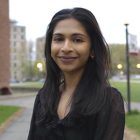Lexy LeMar is a PhD candidate in atmospheric chemistry whose primary research interests are in the process of oxidation. Specifically, Lexy studies the oxidation of volatile organic compounds (VOCs) in the atmospheric aqueous phase through laboratory research and MATLAB-based mechanistic modeling. With the support of a MathWorks Fellowship, she will utilize her novel model to obtain kinetic parameters from chamber and bulk aqueous phase experiments and gain new mechanistic insights on oxidation pathways. She is also developing a model for multiphase experiments involving gas-phase and aqueous aerosol-phase kinetics, with the goal of obtaining rates and products of individual steps from the time-dependent concentrations of a given chemical system. Lexy’s work has great potential to expand our understanding of the atmospheric chemistry of particle formation and growth, processes with profound impacts on air quality, human health, and climate.
https://engineering.mit.edu/wp-content/uploads/2023/10/LeMar-Lexy_mathworks2023_headshot.jpg
Website
Lexy LeMar
Chemical Engineering https://engineering.mit.edu/fellows/lexy-lemar/Peter Zhi Xuan Li is a PhD candidate conducting interdisciplinary research at the intersection of robotics and low-power computing hardware, to enable energy-efficient computing for augmented reality, virtual reality, and autonomous navigation. His paradigm-shifting research addresses a key challenge in efficient computing, which is the cost of storing and accessing data from memory, by taking a memory-centric approach to designing algorithms and computing hardware. A MathWorks Fellowship will support Peter’s promising work in several exciting projects, including a new localization and mapping system-on-chip (SoC) that is highly energy efficient, robust to operating in challenging dynamic environments, and able to produce and store high-quality 3D maps in real- time. By co-designing new algorithms and specialized hardware, the SoC efficiently determines the position and orientation of any device using only visual and inertial measurements to enable a variety of exciting applications, from extended reality on wearable headsets to autonomous navigation of micro-robots. Peter’s research, which makes extensive use of MathWorks tools, offers exciting advances in energy-efficient computing and has great potential to power research and technology development at the intersection of many fields, including robotics, computer architecture, and circuit design.
https://engineering.mit.edu/wp-content/uploads/2023/10/Li_Peter-Zhi-Xuan_mathworks2023_headshot.jpg
Website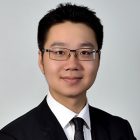
Peter Zhi Xuan Li
Electrical Engineering and Computer Science https://engineering.mit.edu/fellows/peter-zhi-xuan-li/Tianhong Li is a PhD candidate whose research utilizes machine learning (ML) approaches in the development of novel sensing systems. His research has provided important new insights into ML problems, such as learning from unbalanced datasets and improving the robustness of self- supervised learning, enabling it to deal with new modalities. A MathWorks Fellowship will support Tianhong’s work on several exciting projects. The first is a groundbreaking system that provides highly accurate human pose estimation through walls and occlusions by leveraging the properties of RF signals in Wi-Fi frequencies. The second is RF-Pose3D, the first system that infers 3D human skeletons from RF signals; potential applications include gaming, surveillance, and healthcare. Finally, he is conducting a project in unsupervised learning for signals beyond human perception, to leverage unsupervised learning algorithms to utilize unlabeled RF data for pre-training. Tianhong’s algorithms are already in use to monitor the motion of patients with Parkinson’s disease and other motion disorders, and his wide-ranging work offers tremendous promise to advance unique sensing and ML applications and bring new capacity to MathWorks-driven research.
https://engineering.mit.edu/wp-content/uploads/2023/10/Li_Tianhong_mathworks2023_headshot.jpg
Website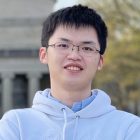
Tianhong Li
Electrical Engineering and Computer Science https://engineering.mit.edu/fellows/tianhong-li/Liang “Charles” Lyu is a PhD candidate whose research interests include improving our understanding of social media and, more broadly, the impact of algorithms on humans and society, with the goal of developing effective strategies to mitigate potentially undesirable impacts, such as the spread of misinformation. Specifically, his research explores the interactions between platforms, users, creators, and content; the effects of platform algorithms and decisions on user behavior; and how these elements relate to societal issues. Supported by a MathWorks Fellowship, Charles will design new algorithms and models to address challenges in real-world scenarios, such as the interplay between social media engagement and diversity, and broader-level work, such as the creation of a framework to examine how taxation of social media advertising might affect behaviors. MATLAB tools are an important component of his work, which has the potential to deepen our understanding of the complex interactions between people and algorithms, maximizing benefits while guarding against possible negative outcomes.
https://engineering.mit.edu/wp-content/uploads/2023/10/Lyu_Liang_mathworks2023_headshot.jpg
Website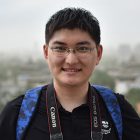
Liang “Charles” Lyu
Electrical Engineering and Computer Science https://engineering.mit.edu/fellows/liang-charles-lyu/Chika Maduabuchi is a master’s student whose research integrates the study of heat transfer and computer vision to explore boiling phenomena, a process with important implications in industries from energy to manufacturing. With the support of a MathWorks Fellowship, Chika will expand his path-breaking project to employ MATLAB for the high-throughput analysis of bubbles from high- speed video camera images and to develop novel algorithms to extract key operating parameters, such as the dry area fraction and contact line densities, that quintessential to understanding and improving boiling phenomena. Chika’s innovative approach of combining thresholding algorithms with convolutional neural networks, particularly within the MATLAB environment, represents a significant advancement in data-driven analysis for boiling phenomena. His research has great potential to advance basic knowledge in this sphere of research and could also enhance the safety and efficiency of nuclear reactors and other thermal systems, with broad societal and industrial impacts.
https://engineering.mit.edu/wp-content/uploads/2023/10/Maduabuchi_Chika_mathworks2023_headshot.jpg
Website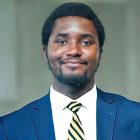
Chika Maduabuchi
Nuclear Science and Engineering https://engineering.mit.edu/fellows/chika-maduabuchi/Colin R. Marcus is a PhD candidate whose research is focused on biomedical applications, with an emphasis on novel sensor platforms and algorithms to enable long-term, personalized healthcare. In recent work, Colin developed a paper-thin, flexible sensor array that can be laminated onto surgical masks and N95 respirators. This innovative technology allows for real-time monitoring of variables such as temperature, humidity, air pressure, and mask fit. Utilizing machine learning techniques, it also provides instant assessments of breathing rate and the position of the mask on the user’s face, among other factors. A MathWorks Fellowship will support Colin’s ongoing work on mechanically adaptive ultrasound patches for large-scale, soft tissue imaging. He has designed a novel ultrasound patch designed specifically for breast cancer detection, enabling individuals to conduct self-scans and capture multiple ultrasound images over several weeks, all without any exposure to ionizing radiation. This technology promises to improve breast cancer survival rates by expanding access to screening with earlier and more accurate screening while lowering costs.
Colin’s exciting research in medical ultrasound imaging and biomedical sensors is yielding valuable new techniques and tools that could move biomedicine forward and improve human health.
https://engineering.mit.edu/wp-content/uploads/2023/10/Marcus_Colin_mathworks2023_headshot.jpg
Website
Colin R. Marcus
Electrical Engineering and Computer Science https://engineering.mit.edu/fellows/colin-r-marcus/Aditya Misra is a PhD candidate in medical engineering and medical physics whose research explores inflammation, a central feature of many prevalent human diseases, including ulcerative colitis, diabetes, and sepsis. Specifically, Aditya aims to develop and apply new technological capabilities to better understand how tissues respond and adapt to inflammation, with the goal of identifying interventions to diagnose and reverse the pathophysiology of these diseases. With the support of a MathWorks Fellowship, Aditya will create new frameworks and tools to spatially and functionally characterize tissue immune responses. The MATLAB-based tools he has built in the course of this work will be valuable to the broader immunology research community in exploring how spatial structures and cell circuits evolve, and how they exacerbate or resolve inflammation. Aditya’s work holds great promise for expanding our understanding of how inflammation remodels tissues and their immune profiles and may offer new directions for the diagnosis and treatment of many inflammatory diseases.
https://engineering.mit.edu/wp-content/uploads/2023/10/Misra_Aditya_mathworks2023_headshot.jpg
Website
Aditya Misra
Institute for Medical Engineering and Science https://engineering.mit.edu/fellows/aditya-misra/Adriana Mitchell is a PhD candidate whose research interests are focused on space exploration, and the application of machine learning (ML) techniques to improve space-based optical navigation under variable illumination conditions during entry, descent, and landing on planetary bodies. A MathWorks Fellowship will support her ongoing project to develop terrain-relative navigation applications, drawing on MATLAB, by creating deep learning approaches for this application.
Adriana has worked with fellow researchers at NASA’s Jet Propulsion Laboratory (JPL) to validate and implement an ML method to robustify terrain-relative navigation during entry, descent, and landing under variable illumination conditions on NASA orbital lunar and Mars imagery. She has also collaborated on an ESA project to validate and implement a tool to determine camera and orbit requirements for visual navigation of a CubeSat around a near-Earth asteroid for ESA’s M-ARGO mission. Adriana’s work holds the potential to give rise to ML techniques that advance space exploration and innovations in aerospace engineering.
https://engineering.mit.edu/wp-content/uploads/2023/10/Mitchell_Adrianna_mathworks2023_headshot.jpg
Website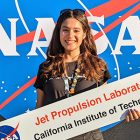
Adriana Mitchell
Aeronautics and Astronautics https://engineering.mit.edu/fellows/adriana-mitchell/Moses C. Nah is a PhD candidate whose research interests lie at the intersection of robotics engineering and motor neuroscience. Specifically, Moses seeks to understand how humans achieve dexterity far superior to modern robots and apply this understanding to bridge the gap between human and robot performance. Through close consideration of the ways in which humans manipulate infinite-dimensional objects with complex dynamics (e.g., a bullwhip), he is testing the hypothesis that humans achieve their remarkable dexterity by using a limited “library” of highly stereotyped actions. Using optimization and computer simulation of several models, Moses has shown that a single such movement was sufficient to achieve accurate target acquisition. MathWorks has been a fundamental tool in Moses’s work, and he is a co-developer of Explicit, an open-source MATLAB-based robotics software, which implements robot kinematic and dynamic equations based on the product-of-exponentials formulation with remarkable computational speed.
A MathWorks Fellowship will enable Moses to expand this successful body of work, which has the potential to help solve challenges in soft robot control and advance research and technology development in robotics at large.
https://engineering.mit.edu/wp-content/uploads/2023/10/Nah_Moses-C_mathworks2023_headshot.jpg
Website
Moses C. Nah
Mechanical Engineering https://engineering.mit.edu/fellows/moses-c-nah/Amin Heyrani Nobari is a PhD student whose research explores mechanical design automation and applied machine learning (ML) for mechanical design, with the goal of making major advancements in engineering design and product development. His current work focuses on automating CAD generation using sequential ML models and large language models, introducing ML models for expediting or replacing high-fidelity physics simulations, and designing under constraints using ML. With the support of his third MathWorks Fellowship, Amin will expand ongoing work to create generative models for inverse kinematic design of linkage mechanisms, which involves developing methods that allow algorithms to suggest 2D planar linkage mechanism designs for any specified target. Furthermore, he will be working on developing generative optimization methods combining deep generative models and optimization methods in engineering design problems. To facilitate his work on generative ML models for linkage synthesis, Amin has created an algorithm that simulates mechanisms 800 times faster than previous methods. His work, which makes extensive use of MathWorks tools, has resulted in several important contributions to computational generative design and has great potential to drive future innovations in the engineering field.
https://engineering.mit.edu/wp-content/uploads/2023/10/Nobari_Amin-Heyrani_mathworks2023_headshot.jpg
Website
Amin Heyrani Nobari
Mechanical Engineering https://engineering.mit.edu/fellows/amin-heyrani-nobari-2/Juliet Okorie is a PhD candidate whose research interests focus on characterizing the energy production and storage capacity of electrodes. Specifically, Juliet is working to optimize a scalable electrochemical cell for methane oxidative coupling (MOC), a process that could potentially convert the greenhouse gas methane into higher-value carbon molecules for jet fuel in a clean and energetically feasible way. With the support of a MathWorks Fellowship, Juliet will continue her work to model this green, inexpensive, and selective electrochemical approach to valorizing methane by creating a corresponding mathematical model that predicts key performance metrics of the process in an electrolyzer so that MOC can eventually be scaled up for commercial use.
Juliet’s MATLAB-based model is expected to be broadly applicable for research in electrochemical catalytic processes. By advancing new methods aimed at turning greenhouse gases into safer and higher-value products, Juliet’s research has strong potential to advance cutting-edge bioelectrochemistry and address significant societal challenges.
https://engineering.mit.edu/wp-content/uploads/2023/10/Okorie_Juliet_mathworks2023_headshot.jpg
Website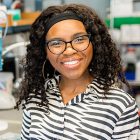
Juliet Okorie
Chemical Engineering https://engineering.mit.edu/fellows/juliet-okorie/Alan Papalia is a PhD candidate whose research in ocean engineering and robotics focuses on novel algorithms for certifiably correct robotic perception, a critical capability for real-world deployment of autonomous systems in performing runtime verification of their models and understanding of the world. Specifically, Alan’s research has developed a certifiable state estimation technique to incorporate range measurements into simultaneous localization and mapping (SLAM) systems, dubbed certifiably correct range-aided SLAM, or SLAM CORA.
A MathWorks Fellowship will enable Alan to continue his pursuit of two innovative goals: to develop distributed techniques needed for a swarm of robots to cooperatively navigate while meeting mission objects and under severe communication restrictions and to develop robust algorithms capable of self-certifying that computed solutions are optimal. These algorithms, which were developed as MATLAB libraries and shared as open-source software, have substantial value to a wide range of robotic systems. Alan’s research holds exciting potential to advance the development of robotics systems, including cooperative AUV networks capable of executing complex missions with high integrity.
https://engineering.mit.edu/wp-content/uploads/2023/10/Papalia_Alan_mathworks2023_headshot.jpg
Website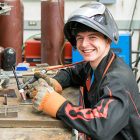
Alan Papalia
Mechanical Engineering https://engineering.mit.edu/fellows/alan-papalia/Jane (Eugene) Park is a PhD candidate whose research explores the structure and property control of a new class of two-dimensional magnetic materials with exciting promise for next-generation quantum computing devices. A MathWorks Fellowship will enable Jane to expand this fruitful work, with the specific aims of elucidating the structural and magnetic properties of air-stable 2D magnets (in particular those showing strong anisotropy in-plane) using various microscopy and theoretical modeling techniques and identifying novel quantum architectures that can serve as optimal platforms for next-generation technologies. MathWorks software is an indispensable tool for Jane’s work, supporting detailed analysis of microscopy data and spin structure simulations critical to understanding the resulting properties. Jane’s research has the potential to advance the design and creation of quantum computing technology and support the development of innovative applications such as topological transistors; magnetic tunnel junctions and other data storage devices; and powerful new approaches in quantum simulation.
https://engineering.mit.edu/wp-content/uploads/2023/10/Park_Jane_Eugene_mathworks2023_headshot.jpg
Website
Jane (Eugene) Park
Materials Science and Engineering https://engineering.mit.edu/fellows/jane-eugene-park/Joshua David John Rathinaraj is a PhD candidate whose research focuses on soft materials, such as complex fluids and soft solids, that are crucial to many industries, including consumer goods, automotive, and oil and gas production industries. Specifically, Joshua’s work addresses the challenges of characterizing and mathematically modeling the mechanics and rheological properties of soft materials. He accomplishes this by developing advanced signal processing techniques to characterize the material’s temporal and frequency dependent rheological responses, as well as by developing governing constitutive differential equations for modeling the rheological properties. His most recent work involves using Gabor transforms to enable the characterization of the temporal and frequency responses of soft materials. This work extensively utilizes MATLAB, and it is now freely available through MathWorks and is being employed by numerous research groups. With the support of a MathWorks fellowship, Joshua plans to employ the Gabor transform techniques to distinguish viscoelasticity and thixotropy in complex fluids. He also aims to use neural differential equations for modeling complex phenomena, such as the yielding and thixotropy of soft materials.
https://engineering.mit.edu/wp-content/uploads/2023/10/Rathinaraj_Joshua_mathworks2023_headshot.jpg
Website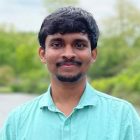
Joshua David John Rathinaraj
Mechanical Engineering https://engineering.mit.edu/fellows/joshua-david-john-rathinaraj/Sebastián Ruiz-Lopera is a PhD candidate in the field of biomedical optics whose research combines cutting-edge optical imaging systems with physics-informed post-processing tools to study tissue such as the retina. Specifically, Sebastián is developing novel approaches in optical coherence tomography (OCT), an imaging technique that provides diverse information about the macro- and micro-structure and functioning of tissue. Previously, he created the first technique for high-resolution imaging of polarization parameters of the retinal nerve fiber bundles in a human subject in vivo, which are hypothesized to encode information on axonal degeneration induced by neurodegenerative diseases. MATLAB is a foundational tool in this work, aiding the development of advanced computational methods to make OCT an even more powerful tool. Supported by a MathWorks Fellowship, he will work to develop a robust processing framework for the estimation of tissue contrast with OCT imaging techniques and to explore innovative AI applications with the potential to vastly accelerate this complex signal process and advance valuable new tools for biomedical optics.
https://engineering.mit.edu/wp-content/uploads/2023/10/Ruiz_Sebastián_mathworks2023_headshot.jpg
Website
Sebastián Ruiz-Lopera
Electrical Engineering and Computer Science https://engineering.mit.edu/fellows/sebastian-ruiz-lopera/Kariana Moreno Sader is a PhD candidate whose research explores new strategies for decarbonizing the trucking sector, a crucial but challenging part of the economy to decarbonize in the interest of mitigating climate change. Kariana’s previous work included investigations of battery electric and hydrogen approaches. Her second MathWorks Fellowship will enable her to extend this work to liquid organic hydrogen carriers (LOHCs), which could be substantially more cost- effective than battery electric and compressed hydrogen and also require only minimal changes to the existing fuel infrastructure. Kariana is developing a new powertrain option featuring onboard hydrogen release, in which engine exhaust heat is recovered to power the dehydrogenation reactor, negating the need for compression or high-pressure onboard storage. MATLAB is a vital tool in Kariana’s research. Her proposed concept, if successful, could transform the trucking industry by offering a cost-competitive alternative to diesel that is simple to implement and globally accessible. Ultimately, Kariana’s work has the potential to advance the decarbonization of long-haul trucking, and the development of other LOHC mobility applications, with significant economic and climate impacts.
https://engineering.mit.edu/wp-content/uploads/2023/10/Moreno-Sader_Kariana_mathworks2023_headshot.jpg
Website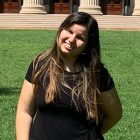
Kariana Moreno Sader
Chemical Engineering https://engineering.mit.edu/fellows/kariana-moreno-sader/Miranda Schwacke is a PhD candidate whose research is focused on developing energy-efficient hardware for machine learning and brain-inspired computing, with the broader goal of reducing the fast-growing energy demands of computing (and associated CO2 emissions) while nurturing technological innovation. Specifically, Miranda is designing and testing electrochemical ionic synapses (EIS), an emerging technology for analog resistive switching in which electrochemically controlled intercalation of ions into and out of a channel allows for dynamic doping of the channel, tuning its resistance. Supported by a MathWorks Fellowship, she aims to expand the types of working ions that can be used in EIS. She also seeks to better understand how channel microstructure impacts device performance, enabling the design of novel, all-solid-state, scalable, fast, energy-efficient, and non-volatile EIS for neuromorphic computing. MATLAB has been instrumental in writing custom scripts for device testing and data analysis. Miranda’s research, integrating materials science and engineering, electrochemistry, and device fabrication and characterization, has the potential to yield important contributions to energy-efficient, brain- inspired computing.
https://engineering.mit.edu/wp-content/uploads/2023/10/Schwacke_Miranda_mathworks2023_headshot.jpg
Website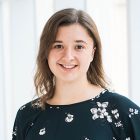
Miranda Schwacke
Materials Science and Engineering https://engineering.mit.edu/fellows/miranda-schwacke/Devosmita Sen is a PhD candidate whose research aims to quantify the topology-property relationships in polymer networks, their fracture properties, structure, and dynamics. A MathWorks Fellowship will support Devosmita’s ongoing work to develop MATLAB-based models of complex polymer networks and create a topological framework for modeling dynamic polymer networks, which can adapt and transform through stimuli-induced bond exchanges. Her goal is to better understand the useful macroscopic properties of these materials, such as self-healing and recyclability. By modeling the crucial aspects of dynamic polymer networks, and extending concepts of graph theory, Devosmita is contributing key new insights in the field. Her innovative research has also served to bring an entirely new area of mathematics (net theory) into polymer research. Overall, Devosmita’s work offers exciting new directions in the study of polymer networks and has the potential to advance the design of novel materials for a wide variety of applications.
https://engineering.mit.edu/wp-content/uploads/2023/10/Sen_Devosmita_mathworks2023_headshot.jpg
Website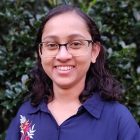
Devosmita Sen
Chemical Engineering https://engineering.mit.edu/fellows/devosmita-sen/Arjav Shah is a PhD candidate whose research focuses on developing sterility testing methods for cell and gene therapies for human disease. Specifically, Arjav is working on new strategies to make biomanufacturing safer through the real-time detection of adventitious agents, such as viruses, at various points in the manufacturing process. With the support of his second MathWorks Fellowship, Arjav is pursuing a highly promising novel application of nanopore sensors to fingerprint viruses. The overarching goal of his project is to develop a machine learning (ML) algorithm that identifies a biomolecule based on its ionic current signature as it is pushed through a nanopore in a freestanding membrane between two electrolyte-filled reservoirs. Arjav’s research employs a combination of multi-scale simulations and ML-driven analysis of experimental data. MATLAB is a vital tool in this work, from model formulation to evaluation and optimization. If successful, Arjav’s nanopore sensor could enhance safety and efficacy in the development of therapeutics for a broad range of diseases and reduce the time required for sterility testing from 2-4 weeks to just hours. His work is also generating innovative new MATLAB tools that are a valuable resource for the nanopore research community.
https://engineering.mit.edu/wp-content/uploads/2023/10/Shah_Arjav_mathworks2023_headshot.jpg
Website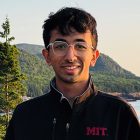
Arjav Shah
Chemical Engineering https://engineering.mit.edu/fellows/arjav-shah-2/Saba Shaik is a PhD candidate whose research interests concern the detailed electrochemistry that occurs in electrospray thrusters. A MathWorks Fellowship will support her work to introduce novel experimental methods to characterize these processes and collect and analyze vast amounts of data in MATLAB to develop numerical models of relevant physical phenomena. Her current efforts are centered on determining the composition (molecular and atomic) of species generated via electrochemical processes. The data are obtained as time-cascade quadrupole mass spectra diagrams in which different peaks represent different species. A principal objective of Saba’s work is to design efficient physics-based pattern recognition algorithms to manage various confounding factors (for example, some species are generated through ion beam interactions with vacuum chamber walls, not electrochemistry) and extract useful information from large amounts of overlapping data. Saba’s work has tremendous promise to produce valuable tools and approaches that could advance the field and support the efforts of other researchers.
https://engineering.mit.edu/wp-content/uploads/2023/10/Shaik_Saba_mathworks2023_headshot.jpg
Website